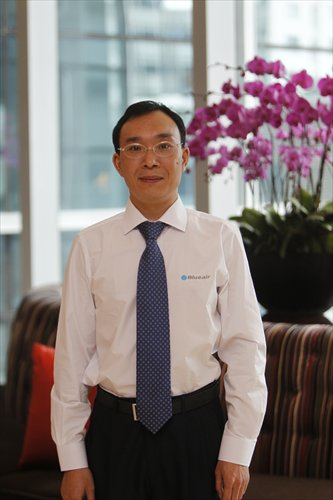Breathing easier with Blueair

Blueair China's general manager Li Kaijiu. Photo: Courtesy of Blueair China
It's easy to think about air pollution as an outdoor problem, but an alarming number of harmful airborne particles can be found floating around your home or office. In Beijing, public awareness about the risk of indoor air pollution has been steadily growing as people seek to turn their homes into clean-air sanctuaries. By 2012, China's air-purifier market had 56 domestic and international brands. By the end of this year, that number is predicted to reach more than 200.
One company that has become a household name in this sector is Blueair, a leading Swedish air-purifier manufacturer founded in 1996.
The company has built a reputation as a pioneer in its field since entering the Chinese market in 2006, years before air quality was a hot-button issue. Blueair opened its Beijing representative office in April 2014 to serve the local market with its local professional team.
Blueair air purifiers can be found in dozens of countries around the world. Its units can be found in embassies, government agencies, medical centers, universities, restaurants, hotels and regular homes.
Blueair China's general manager Li Kaijiu spoke to the Metropolitan (MB) to share his company's vision for growth in an increasingly competitive market.
MB: What are some of Blueair's advantages that separate it from competitors?
Li: Our units are sold in more than 50 countries around the world. Blueair delivers clean indoor air for people in their homes and offices, improving people's health and well-being faster than any rival air purifier.
Blueair air purifiers efficiently and silently remove 99.97 percent of allergens, asthma triggers, viruses, bacteria and other airborne pollutants. The performance of all Blueair purifiers is independently verified by the Association of Home Appliance Manufacturers (AHAM) and its Clean Air Delivery Rate (CADR) program through testing at a third-party laboratory.
Our company's air purifiers meet strict energy efficiency guidelines set by the US Environmental Protection Agency and the Department of Energy. They also carry the Energy Star, signifying they are 40 percent more energy-efficient than standard models.
In a test on the performance of 22 different air purifiers sold in China in 2013, the Shanghai Consumer Rights Protection Commission reported that the Blueair 503 model was unrivaled in its ability to remove both PM2.5 particles and formaldehyde from the air.
MB: How often do filters in a Blueair air purifier need to be changed?
Li: Replacing the standard particle filter in a Blueair unit on time is critical to ensure its air filtration system works efficiently.
We recommend that our filters be changed on average every six months or so, depending on the degree of indoor pollution and model, to ensure they consistently deliver maximum efficiency.
MB: How have Blueair's sales in China fared in recent years? Has the company grown its market share?
Li: We don't disclose our sales figures or market share for competitive reasons. However, we make no secret of the fact that our sales have been increasing annually for many years as public awareness has grown about the potential health hazards of breathing polluted air, both outdoors and indoors.
As one of the world's leading manufacturers of premium indoor air purifiers, we have a sizeable market share within our niche.
MB: What are the demographics of Blueair's customers?
Li: Any person who worries about the quality of their indoor air is a potential customer.
When we started, many people with respiratory problems, such as asthma, purchased Blueair air purifiers. But nowadays our customer base includes anyone concerned about protecting the health and well-being of themselves, their family and co-workers.
MB: What future challenges does Blueair face?
Li: The biggest challenge we face is helping consumers understand that the indoor air purification industry is fraught with exaggerated claims. Statements that an air purifier can tackle chemical pollutants from indoor decorations, for example, are simply not true.
These kinds of pollutants can only be released after a certain period of time, and no air purifier can delay or speed up this process.
If indoor air quality received the same attention and focus as outdoor pollution, millions of lives could be improved. We intend to continue raising awareness about air pollution, while providing individuals and organizations with real solutions that actually work.